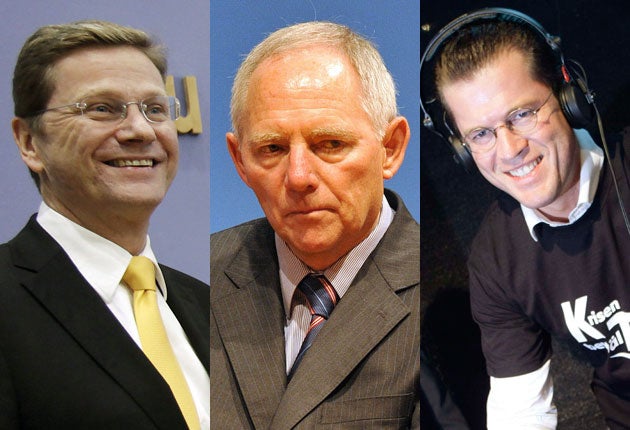First gay Foreign Minister wins a place in Merkel’s dream team

Your support helps us to tell the story
From reproductive rights to climate change to Big Tech, The Independent is on the ground when the story is developing. Whether it's investigating the financials of Elon Musk's pro-Trump PAC or producing our latest documentary, 'The A Word', which shines a light on the American women fighting for reproductive rights, we know how important it is to parse out the facts from the messaging.
At such a critical moment in US history, we need reporters on the ground. Your donation allows us to keep sending journalists to speak to both sides of the story.
The Independent is trusted by Americans across the entire political spectrum. And unlike many other quality news outlets, we choose not to lock Americans out of our reporting and analysis with paywalls. We believe quality journalism should be available to everyone, paid for by those who can afford it.
Your support makes all the difference.Angela Merkel's new centre-right coalition government will take office this week on a pledge to slash income taxes and with a controversial and openly gay foreign minister who is renowned for refusing to answer questions in English.
The German Chancellor’s conservative Christian Democrats and their pro-business, liberal Free Democrat partners finally reached agreed the shape of their future government this weekend, ending three weeks of wrangling that followed the September vote.
The new government’s main objective is to cut income taxes by €24bn from next year. “The burden on families has to be lessened,” Ms Merkel said. “We are aiming for growth. We want to advance courageously into the future.”
The measures are a bold attempt to kick-start the Europe’s largesteconomy out of recession and amount to a significant victory for the Free Democrats, whose campaign promise to cut taxes helped them to the best election result in the party’s history.
But several economists remain sceptical about how the government will be able to finance its tax plans in light of Germany’s spiralling €1.5trn public debt.
Frank-Walter Steinmeier, the opposition leader ditched as Ms Merkel’s coalition partner, described the new government’s plans as a “grand false start”. Even the new Finance Minister, Wolf gang Schäuble, admitted in a weekend interview that there was no hope of achieving a balanced budget over the next four years.
Mr Schäuble’s appointment was wholly unexpected. The 67-year-old wheelchair-bound politician, who was shot and almost killed by a mentally-deranged assailant 18 years ago, has often clashed with Ms Merkel, particularly over tax cuts. But the former interior minister, who was one of the architects of German reunification, is valued as a highly experienced politician who can be trusted to help lift the economy out of recession.
The decision to give Guido Westerwelle, the Free Democrats’ openly gay leader, the job of Foreign Minister has also raised eyebrows in Germany. The 47-year-old has limited experience in foreign affairs and claimed before the election that he would like to be agriculture minister because that was an area he understood.
Neither is he renowned for diplomatic tact. He was lampooned last month after he refused to answer a question from a BBC reporter in English. “We are in Germany,” Mr Westerwelle snapped. “We speak German here.”
There was speculation in the German media yesterday that Ms Merkel had appointed the untried Mr Westerwelle as Foreign Minister to ensure that she continued to shine as Germany’s leading light on the international circuit.
The Chancellor’s third surprise was her decision to give the Defence portfolio to her former finance minister, the popular 37-year-old conservative aristocrat Karl-Theodor zu Guttenberg. The Bavarian conservative, nicknamed the “Rocking Baron”, is one of the rising stars of German politics. Unlike Mr Westerwelle, he enjoys speaking fluent English and is a foreign policy expert. His main task will be to oversee Germany’s deployment of 4,500 troops in Afghanistan and explain the reasons for their presence to a hostile public. In the past, he has advocated the deployment of German troops in southern Afghanistan, an option which has been ruled out so far by Ms Merkel.
Mr zu Guttenberg is no longer the youngest minister in the German government. He has lost that title to 36-year-old Philipp Rösler, who takes over the Health Ministry and is also the country’s first Asian-born minister. A newcomer on the national scene, Mr Rösler was born in Vietnam and was adopted by German parents as a child.
Angela’s choice: The new cabinet members
Guido Westerwelle
Age: 47
Post: Foreign Minister
He led the Free Democrats to their greatest victory in the September poll, netting 15 per cent of the vote. But he has little foreign affairs experience. He wants to back human rights and improve German-US relations.
Wolfgang Schäuble
Age: 67
Post: Finance Minister
The veteran conservative held posts in Chancellor Kohl's government and is a tough negotiator not afraid of making unpopular decisions. But he has clashed with Chancellor Merkel about her proposals for tax cuts.
Karl-Theodor zu Guttenberg
Age: 37
Post: Defence Minister
The "Rocking Baron" is a popular politician in an unpopular job. He speaks fluent English and is a foreign affairs expert. He will defend the role of Germany's 4,500 troops in Afghanistan to a hostile public.
Join our commenting forum
Join thought-provoking conversations, follow other Independent readers and see their replies
Comments